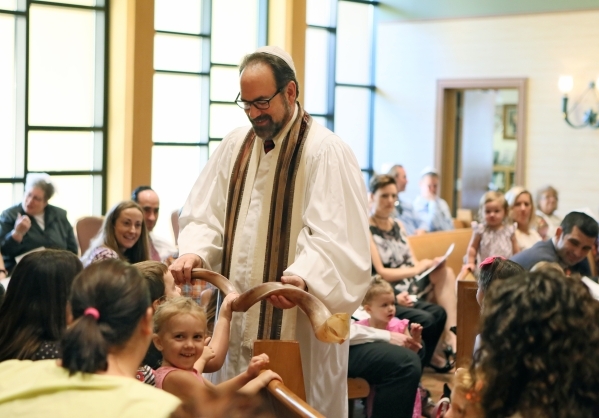Teaching preschoolers the meaning of Rosh Hashana observation
"What day is today?" Rabbi Sanford Akselrad quizzed the preschoolers gathered at Congregation Ner Tamid on Monday morning.
"Is it Halloween?" he asked. "That's pretty scary if you'd say that. Cantor, is this Grandparents Day?"
"That was yesterday," Congregation Ner Tamid Cantor Jessica Hutchings responded.
"So it's not even Grandparents Day," the rabbi said. "What day is it?"
"It's Rosh Hashana!" the children shouted.
Two-year-old Darah Wardly leaped to her feet, bounced up and down and called out, "Yay, yay, yay!"
And why not, she and her twin sister, Sloane, and all their friends weren't just in a religious service, they were at a birthday party.
"Everybody loves birthdays. Whose birthday is it?" Akselrad asked.
"The world's!" called out the children.
"That's right," the rabbi answered. "Rosh Hashana is the birthday of the world."
And what better way to celebrate than with services designed with children in mind.
"We put it on a level they can understand," said Lonnie Kritzler, the temple's director of education. She said even the youngest of children can be encouraged to consider, "How can you do better, listen better, be nicer to your friends?"
The two days of Rosh Hashana head up the Jewish High Holy Days, a celebration of the new year and the anniversary of man's creation. The faithful gather to pray, to express appreciation for the past year and hopes that the coming year be blessed.
"For Jews, this time is when you're symbolically written into the Book of Life," Kritzler said.
On Rosh Hashana, the Book of Life is opened, and everyone gets 10 days to reflect and repent in an effort to tip the scales of justice in their favor before Yom Kippur, the Day of Atonement.
"That's where you sit and atone for your sins and say, 'I am really sorry I did all that, I will try so much harder,'" Kritzler said.
For preschoolers, still presumably untouched by concerns of sin, Rosh Hashana is a party punctuated by dipping apples into honey in hopes of a sweet new year.
Praying along with Akselrad from a custom prayer book, they thanked God for "the blue skies, the sunshine, the stars and the mountains … for the birds singing and the crickets chirping ... for hugs and kisses and love."
They thanked God for making "pandas and polar bears, giraffes and puppy dogs, flowers and trees, elephants and ants."
Singing along with Cantor Hutchings, they imagined how it must have felt to be released from Egypt and to walk through the Red Sea to freedom.
Every birthday party needs noisemakers. Rosh Hashana's is a ram's horn.
As the grade school-age service's prayer book explains, when people all lived in one place, getting the word out was easy. You just sent yellers out to shout the news. But with people all over the place, yellers couldn't get the events across. Some special occasions demanded announcement, and the arrival of the new year was the most special of all.
So Enoch asked God what to do. God suggested an announcing tool. Enoch's first try was banging rocks together. Rocks made noise, not music. The gong was rejected because it was iron, much like weapons of war. The harp was lovely but emitted too soft a sound for rejoicing. The trumpet was loud and melodic but crafted by human hands. "The new year is not a time to glorify human creations," Enoch learned. "The new year is for all creatures."
Finally Enoch presented a humble ram's horn, naturally hollow, loud and just the thing to announce the new year. But Enoch remarked that all the other instruments had been easy to play, while the ram's horn was nearly impossible. So God taught Enoch to blow the ram's horn.
The staff at Congregation Ner Tamid continues to teach religious school students to play the ram's horn, or shofar. And it is used as a beckoning tool to wake the faithful from their slumber so they can search their behavior, be the best they can be and remember their creator.
Preschoolers are set to return Wednesday for Yom Kippur services. For more information, visit lvnertamid.org.























